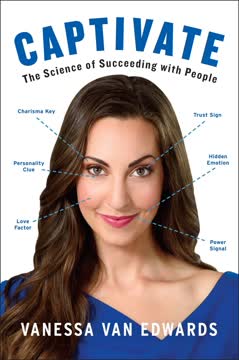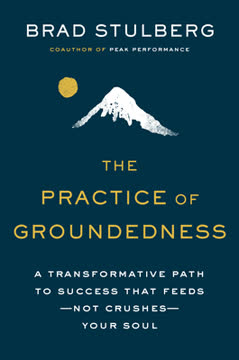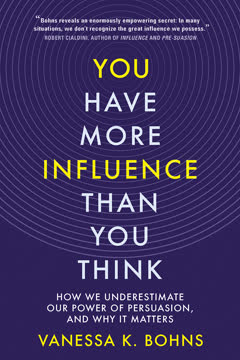Key Takeaways
1. You're More Noticeable Than You Think
You are a person, not an ad, and people are wired to notice other people.
The Invisibility Cloak Illusion. People tend to underestimate how much they are observed by others. We often feel invisible, as if we're wearing an invisibility cloak, but in reality, people notice us more than we realize. This is because when we look at others, we try to hide that fact, so we rarely see evidence that we're being watched.
The Spotlight Effect. While we underestimate how much people pay attention to us in general, we overestimate how much they pay attention to our insecurities. People aren't as focused on our flaws as we think they are. This means that while we may feel like everyone is staring at our awkward cowlick, in reality, most people aren't even noticing it.
Your Presence Matters. Our presence can change how others experience something, causing them to think, feel, or act differently. Sharing an experience with someone amplifies it, whether it's pleasant or unpleasant. People are naturally curious about others and try to figure out what's going on in their heads, which can influence their own thoughts and feelings.
2. You're More Persuasive Than You Believe
People like you more than you realize, which in turn means you have more influence than you realize.
Underconfidence in Social Skills. People tend to believe they are less socially active and have less influence than their peers. This is because we compare ourselves to exemplars of sociability and influence, rather than the average person. As a result, we underestimate our own power of persuasion.
The Liking Gap. People generally like you more than you think they do. We often focus on our perceived flaws and awkward moments, but others are more likely to pick up on positive cues and form a favorable impression. Since people are more persuaded by those they like, this means you have more influence than you realize.
Relax and Be Yourself. Because we underestimate how much people like us, we brace ourselves for a fight, obsess over what to say, and pile on the facts. But in reality, people are more receptive to our messages than we think. We can often take it down a few notches and still be effective.
3. People Are Inclined to Say "Yes" More Often Than You Expect
Over and over, people are almost twice as likely to agree to the range of things my participants ask for in these studies as they expect.
Underestimating Compliance. People consistently underestimate how many others will agree to their requests. This holds true for various requests, from filling out questionnaires to donating to charity. This undue pessimism can prevent us from asking for things that would make our lives easier or better.
The Power of Asking. The simple act of asking can be surprisingly effective. People are often willing to go out of their way to help, even if it means walking a stranger three city blocks. This is because people want to feel helpful and make a positive impact.
Beyond Small Requests. This effect extends to larger requests as well. People underestimate how much others are willing to donate to their cause or how much effort they'll put into fulfilling a request. This is because we tend to focus on the costs of complying, while overlooking the many reasons people have for saying "yes."
4. It's Harder to Say "No" Than You Realize
We regularly make better, less awkward impressions on other people than we think we do.
The Power of Politeness. People often agree to requests to avoid awkwardness and embarrassment. Saying "no" can threaten the "face" of the person asking, implying that they are untrustworthy or making an unreasonable request. To avoid this, people often say "yes" even when they'd rather not.
The In-Person Advantage. It's much harder to say "no" to someone in person than over email or the phone. This is because refusing someone face-to-face is more direct and potentially embarrassing. As a result, showing up in person can be a surprisingly effective influence tactic.
The Illusion of Courage. We tend to underestimate how difficult it is for others to say "no" to us. We assume that people will feel comfortable rejecting our requests if they're not interested, but in reality, they may feel pressured to comply to avoid awkwardness or embarrassment. This can lead us to overestimate how likely we are to be rejected.
5. Power Blinds You to Your Own Influence
A powerful person’s whisper sounds more like a shout.
Reduced Perspective-Taking. People in positions of power tend to make less of an effort to take other people's perspectives. This is because they are less dependent on others and don't need to understand their thoughts and feelings as much. As a result, they may be oblivious to the impact of their words and actions on others.
The Freedom to Act. Power reduces the "press of the situation," meaning that people with power feel freer to do what they want, rather than what the situation calls for or what others want them to do. This can lead them to disregard social norms and be less worried about how they look to others.
The Illusion of Choice. People in positions of power often assume that others are free to do what they want, even when they are not. They may see their suggestions as optional, even though those suggestions feel like commands to people with less power. This can lead to abuses of power and a failure to recognize the coercive nature of their influence.
6. See, Feel, and Experience Your Influence
If you don’t have anything to say, it’s okay to stay silent.
Get Out of Your Own Head. To see the impact of your actions on others, you need to get out of your own head and recognize the role you play in creating the situations you are in. This involves visualizing interactions from a third-party perspective and considering the broader context in which events are unfolding.
Get Perspective, Not Take Perspective. To truly understand how others are impacted by you, you need to get inside their heads and feel what they feel. This involves gathering additional information about their actual thoughts and feelings, rather than relying on your own assumptions. The most effective way to do this is to simply ask.
Experience Your Influence. While experience can be a powerful tool for understanding your influence, it's important to be aware of its limitations. Negative experiences tend to loom larger than positive ones, and any one experience can never be broad enough in scope to offer a complete understanding of your influence.
7. Use Your Influence Wisely
Once you are aware of the influence you have, you may indeed decide to go forth and boldly use this newly discovered influence.
Recognize Your Responsibility. The goal of this book isn't just to help you gain influence, but to make you more aware of the influence you already have but don't realize. Once you are aware of this influence, you may decide to use it more boldly, or you may decide to take a step back and use it less.
Be Mindful of Your Impact. The key is to use your influence more mindfully. This means being more emboldened to exercise your influence when it makes sense to do so, while also taking greater responsibility for the influence you may at times wield in ways you don't intend or may not even be aware.
Make Your Influence Count. If the things we say and do have the potential to reverberate in other people's heads the way they do in ours, we should try to make those things count. This means using our influence to advocate for what we need and what we believe in, while also being mindful of the potential consequences of our words and actions.
Last updated:
FAQ
What’s You Have More Influence Than You Think by Vanessa Bohns about?
- Core premise: The book explores how people consistently underestimate their power of persuasion and influence in everyday life, often failing to realize the impact of their words, actions, and presence.
- Research-based insights: Vanessa Bohns draws on psychological studies to show that even small gestures—like compliments or simple requests—can have a significant effect on others.
- Scope of influence: The book covers a range of contexts, from casual conversations and social media to workplace dynamics and ethical dilemmas, highlighting both positive and negative aspects of influence.
- Goal of the book: Bohns aims to help readers recognize and use their influence more mindfully, balancing confidence with responsibility.
Why should I read You Have More Influence Than You Think by Vanessa Bohns?
- Empowerment through awareness: The book corrects the common misconception that we are ineffective or invisible, providing evidence that we have more social power than we think.
- Practical advice: It offers actionable, research-backed strategies for asking for help, expressing gratitude, and navigating social situations more effectively.
- Ethical influence: Bohns encourages readers to use their influence thoughtfully, warning about the unintended consequences of careless words or actions.
- Improved relationships: Understanding your influence can boost confidence, reduce social anxiety, and foster more authentic connections.
What are the key takeaways from You Have More Influence Than You Think by Vanessa Bohns?
- Underestimation of influence: Most people don’t realize how much others notice, like, and comply with them in daily interactions.
- Fear and embarrassment: The dread of rejection and social awkwardness often prevent people from asking for what they want or need.
- Subtle, everyday influence: Influence is often exerted through small, indirect means—like presence, shared experiences, and audience tuning—rather than overt persuasion.
- Responsibility and ethics: Recognizing your influence means using it mindfully, asserting yourself when appropriate, and avoiding unintended negative impacts.
What is the "invisibility cloak illusion" in You Have More Influence Than You Think by Vanessa Bohns?
- Definition: The "invisibility cloak illusion" is the mistaken belief that we are less noticed and observed by others than we actually are.
- Research findings: Studies show people underestimate how much others pay attention to their behavior, appearance, and presence, leading to a false sense of anonymity.
- Implications for influence: Realizing that others notice us more than we think means we have more power to affect their thoughts and feelings, even unintentionally.
- Behavioral consequences: This illusion can lead to both missed opportunities for positive influence and unintentional negative impacts.
How does Vanessa Bohns explain the "liking gap" and its relevance to influence in You Have More Influence Than You Think?
- Definition: The "liking gap" is the phenomenon where people underestimate how much others like them after social interactions.
- Research evidence: Studies show that participants consistently believe their conversation partners like them less than they actually do.
- Impact on behavior: This gap leads to unnecessary social anxiety and causes people to hold back from engaging or asking for help.
- Influence implications: Recognizing the liking gap can boost confidence and encourage more authentic, effective communication.
How does You Have More Influence Than You Think by Vanessa Bohns address why people underestimate their social connectedness and persuasive power?
- Comparisons to others: People often compare themselves to highly social individuals, leading to the belief that they are less influential or connected than average.
- Underconfidence in influence: Unlike other domains where people are overconfident, in social influence, people tend to underestimate their reach and persuasive abilities.
- Social media insights: Even modest follower counts on platforms like Twitter or Instagram place users in the top percentiles, yet people still underestimate their online influence.
- Missed opportunities: This underestimation leads to missed chances for connection, persuasion, and positive impact.
What does Vanessa Bohns reveal about how people respond to requests and why asking is so difficult in You Have More Influence Than You Think?
- People say "yes" more: Research shows that people are much more likely to agree to requests than we expect, from small favors to more significant asks.
- Fear of rejection: The anticipation of being turned down is often worse than the reality, with compliance rates nearly twice as high as expected.
- Monetary incentives: Offering small amounts of money does not significantly increase compliance, but it can make the asker feel more comfortable.
- Practical takeaway: Direct, in-person requests are more effective than we realize, and we should not let fear of rejection hold us back.
Why is it hard for people to say "no" according to You Have More Influence Than You Think by Vanessa Bohns?
- Embarrassment avoidance: Saying "no" is socially awkward and can create "insinuation anxiety," where refusal risks embarrassing both parties.
- Social norms: Politeness and the desire to maintain "face" make people reluctant to refuse, especially in face-to-face situations.
- Power dynamics: The pressure to comply is even greater when the requester holds authority or power.
- Research examples: Classic studies like the bystander effect and Milgram’s obedience experiments illustrate how social pressure inhibits refusal.
How does embarrassment affect the effectiveness of influence tactics in You Have More Influence Than You Think by Vanessa Bohns?
- Face-to-face requests: People are much more likely to comply with in-person requests because refusing is more embarrassing.
- Email and digital asks: Requests made via email or text are easier to ignore or refuse, as they lack the immediate social pressure.
- Underestimation of effect: Both requesters and observers often fail to appreciate how much more persuasive in-person requests are compared to electronic communication.
- Practical implication: If you want a "yes," ask in person whenever possible.
What does You Have More Influence Than You Think by Vanessa Bohns say about the dangers of underestimating our influence and the consequences of unethical asks?
- Unethical compliance: People often agree to unethical requests, such as lying or vandalizing, more than requesters expect, due to discomfort with saying "no."
- Weaponization of awkwardness: Social pressure and embarrassment can be exploited, leading to unwanted advances or inappropriate behavior, especially in power-imbalanced situations.
- Misjudging discomfort: Those making requests often underestimate how uncomfortable their targets feel, leading to negative outcomes like avoidance or career changes.
- Responsibility reminder: Recognizing your influence is crucial to prevent unintentional harm and foster ethical interactions.
How does Vanessa Bohns address the role of power in perceived influence in You Have More Influence Than You Think?
- Reduced perspective-taking: People in positions of power are less likely to consider others’ perspectives, making them oblivious to the impact of their actions.
- Freedom and blame: Those with power feel freer to act and are more likely to blame others for outcomes, assuming everyone has the same freedom to choose.
- Power as responsibility: Bohns emphasizes that power should be seen as a responsibility, not just an opportunity, to encourage ethical use of influence.
- Systemic implications: Recognizing power dynamics is essential for preventing abuses and fostering more inclusive environments.
What strategies does Vanessa Bohns suggest for becoming more aware of your influence in You Have More Influence Than You Think?
- Get out of your head: Visualize interactions from a third-party perspective to better understand your role and impact.
- Seek real perspective: Instead of assuming you know what others think, actively ask and listen to gain accurate feedback.
- Experience influence directly: Try exercises like Rejection Therapy—asking for things and facing rejection—to see firsthand how much influence you have.
- Limitations acknowledged: These strategies may vary in effectiveness depending on individual circumstances, but they help build awareness and confidence.
What are the best quotes from You Have More Influence Than You Think by Vanessa Bohns and what do they mean?
- “You have more influence than you think.” This central message encourages readers to recognize and embrace their everyday power to affect others.
- “Power should be construed as responsibility, not just opportunity.” Bohns reminds us that influence comes with ethical obligations, especially for those in authority.
- “The dread of asking is often worse than the reality.” This quote highlights how our fears about rejection are usually exaggerated, and that people are more willing to help than we expect.
- “We are not as invisible as we think.” A reminder that our presence and actions are noticed by others, even when we feel overlooked.
- “Most people want to say yes.” This insight encourages readers to ask for help or favors more confidently, knowing that compliance is more common than assumed.
Review Summary
Readers praise You Have More Influence Than You Think as an insightful, well-researched book that offers a fresh perspective on influence. Many appreciate Bohns' engaging writing style, combining scientific studies with relatable anecdotes. The book challenges readers to recognize their impact on others, both positive and negative. Reviewers found it empowering and thought-provoking, noting its relevance to current social issues. Some critics felt the writing style was dense or repetitive, but overall, the book received high ratings for its unique approach and practical implications.
Similar Books








Download PDF
Download EPUB
.epub digital book format is ideal for reading ebooks on phones, tablets, and e-readers.





